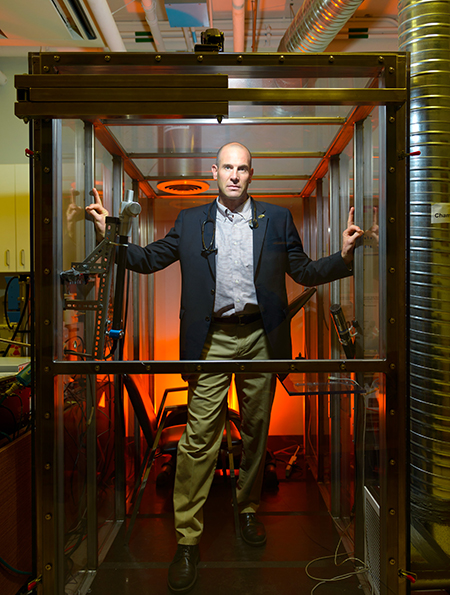Just two hours of exposure to diesel exhaust fumes can lead to fundamental health-related changes in biology by switching some genes on, while switching others off, according to researchers at the University of British Columbia and Vancouver Coastal Health.
The study involved putting volunteers in a polycarbonate-enclosed booth — about the size of a standard bathroom — while breathing in diluted and aged diesel exhaust that approximates the air quality along a Beijing highway, or under certain conditions at busy ports, rail yards, mines and industrial sites.
The researchers examined how such exposure affected the chemical “coating” that attaches to many parts of a person’s DNA. That carbon-hydrogen coating, called methylation, can silence or dampen a gene, preventing it from producing a protein – sometimes to a person’s benefit, sometimes not. Methylation is one of several mechanisms for controlling gene expression, which is the focus of a rapidly growing field of study called epigenetics.
The study, published this month in the Particle and Fibre Toxicology, found that diesel exhaust caused changes in methylation at about 2,800 different points on people’s DNA, affecting about 400 genes. In some places it led to more methylation; in more cases, it decreased methylation.
How these changes in gene expression translate to health is the next step for researchers. But this study shows how vulnerable our genetic machinery can be to air pollution, and that changes are taking place even if there are no obvious symptoms.
“Usually when we look at the effects of air pollution, we measure things that are clinically obvious – air flow, blood pressure, heart rhythm,” said senior author Chris Carlsten, an Associate Professor in the Division of Respiratory Medicine. “But asthma, higher blood pressure or arrhythmia might just be the gradual accumulation of epigenetic changes. So we’ve revealed a window into how these long-term problems arise. We’re looking at changes ‘deep under the hood.’”
The fact that DNA methylation was affected after only two hours of exposure has positive implications, said Dr. Carlsten, the AstraZeneca Chair in Occupational and Environmental Lung Disease.
“Any time you can show something happens that quickly, it means you can probably reverse it” – either through a therapy, a change in environment, or even diet, he said.
Dr. Carlsten’s team, having catalogued the changes along the entire human genome, is now sharing its data with scientists who are delving into the function of specific genes.
Dr.Carlsten and lead author Ruiwei Jiang, a graduate student supervised by Michael Kobor, an Associate Professor of Medical Genetics, have already highlighted methylation changes on several places in the genome that have a direct bearing on lung health. One of those changes would lead to less production of a protein called GSTP1, which helps “clean up” toxic molecules that disrupt the normal functioning of cells.
Dr. Carlsten and Prof. Kobor, a Canada Research Chair in Social Epigenetics, are part of a national project exploring how the environment and epigenetics affect lung health. The project is funded by AllerGen Inc., a Canadian research network funded by Industry Canada through the Networks of Centres of Excellence Program.
